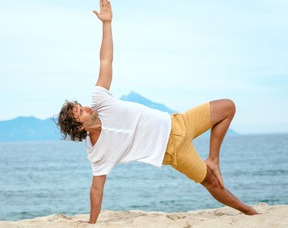Yoga is derived from the Sankrit word “yuj” which means “to unite or integrate”. It is a mind and body practice with historical origins in ancient Indian philosophy and has quickly become popular as a form of physical exercise. Various styles combine physical postures, breathing techniques, and meditation or relaxation.
According to a recent clinical trial out of the Perelman School of Medicine at the University of Pennsylvania, prostate cancer patients who attended semiweekly, 75-minute, teacher-led sessions during their radiation therapy treatment reported improved overall well-being, including feeling less fatigued and improved sexual function, as opposed to the control group that didn’t practice yoga.
Between October 2014 and January 2016, a total of 50 prostate cancer patients who had undergone between six and nine weeks of radiation treatment were split into two groups, one practicing yoga and the other not. The sessions usually incorporated positions such as sitting, standing, and reclining positions that were modified using props to adapt to each patient’s needs and restrictions.
“Levels of patient-reported fatigue are expected to increase by around the fourth or fifth week of a typical treatment course, but that did not happen in the yoga group. Both the severity of the fatigue as well as the patient’s’ ability to go about their normal lives appeared to be positively impacted in the yoga group.”
-Dr. Neha Vapiwala
Individuals performing yoga experienced less fatigue over the course of their treatment, while those who didn’t in reported increased levels of fatigue as their radiation treatment progressed. Researchers also examined the effects that it had on sexual health, in particular erectile dysfunction. The yoga group remained at baseline as far as erectile dysfunction was concerned but those who weren’t in the group declined below baseline during treatment.
“Yoga is known to strengthen pelvic floor muscles, which is one of several postulated theories that may explain why this group did not demonstrate declining scores, as seen in the control group.”
-Dr. Neha Vapiwala
In addition, the study also found that while the emotional and physical well-being of both groups increased as patients progressed through treatment, the evaluation scores of those in the yoga group grew more rapidly than those in the control group. For more information you can refer to the study which was published in the International Journal of Radiation Oncology, Biology, and Physics.


